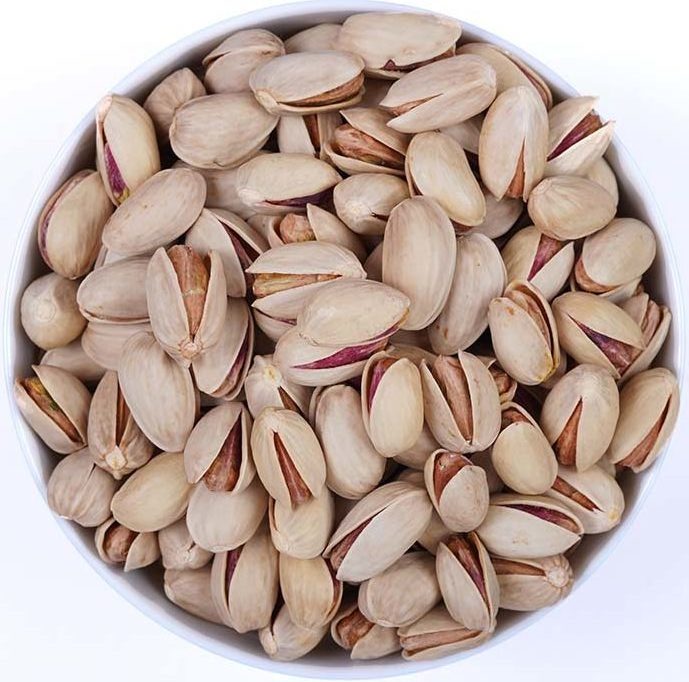
Pistachio is a product with a unique reputation, by which our land, Iran, has become far-famed around the world. Pistachio is a popular and best-loved fruit that is a member of the nuts family and among others pistachio is well-known as the King of Nuts.
The nutritional value, flavor, easy digestion, and high calorie are among characteristics that has made this fruit superior among majority of fruits. Furthermore, there are considerable amounts of various vitamins and minerals in pistachios.
Chemical Compounds:
100g of pistachios contains 590Kcal energy, 54g fat, 20g protein, 28g carbohydrate, 7.5g sugars, 10g fiber, all types of Vitamin A, niacin, folate, Vitamin E and a variety of minerals including iron, magnesium, copper, zinc, potassium, etc.
Iran is the world’s largest center of pistachio production.
Among the types of pistachio in Iran we can point to Hazelnut (Round) pistachio, Ahmad Aghaei (Long) pistachio, Akbari (Super Long) pistachio, Badami (Long) pistachio, Jumbo (Kale Ghouchi) pistachio.
Benefits of Pistachio:
Avicenna, the famous Iranian physician, considered the pistachio kernel beneficial in the treatment of liver infection and sexual dysfunction, in preventing nausea and vomiting, and in strengthening the stomach and the heart.
- Compared to other nuts, pistachio nuts are low in calories and fat, and are cholesterol-free. Fat is a source of energy and helps absorb vitamins D, E, A and K.
- It is among the top vegetable protein sources.
- Pistachios are rich in fiber, so they help digestion and regulate cholesterol and blood sugar.
- Pistachios intake increases HDL (good) cholesterol and at the same time reduces LDL (bad) cholesterol.
- Due to its content of vitamin E, magnesium, and potassium, and the antioxidant property of vitamin E, pistachios intake regulates blood pressure, strengthens the immune system, is beneficial for eye health, prevents fatigue and stress, and also prevents cell destruction and muscle cramps.
- Vitamin B6 available in pistachio helps protein metabolism and also plays a role in food absorption. Vitamin B1 also increases energy, strengthens nerve cells and controls appetite.
- Iron in pistachios is useful for dizziness, fatigue, paleness and anemia.
- Phosphorus in pistachios helps build bones and teeth, and prevents fatigue and weakness, and it is useful for strengthening body muscles.
The pistachio tree bears fruit 7-9 years after planting and can withstand temperatures of 45 degrees above zero and 25 degrees below zero. Pistachio is a plant resistant to drought and dehydration and is cultivated in large quantities in Iran regions of Damghan, Kerman, Azerbaijan, Qazvin, Ardestan and Rafsanjan.
Pistachio kernels are energetic and rich in nutrients. Pistachios contain a good amount of iron and calcium, which is very beneficial to be added to vegetarian diets. In traditional medicine, decoction of pistachio bark and leaves was used to treat skin conditions such as scabies and itching. Pistachios are also recognized effective to improve memory and strengthen heart and stomach.
Nutrients in 100g of pistachios include:
601Cal energy; 17g protein; 55g fat; 6g fiber; 4mg vitamin E; 110mg calcium; 3mg iron; 2mg zinc; 6 microgram selenium, 58 microgram folate.
Salted Pistachios
Weight 100g – 250g – 200g – 500g
Packaging: Cellophane
Nutrition facts in 100g
